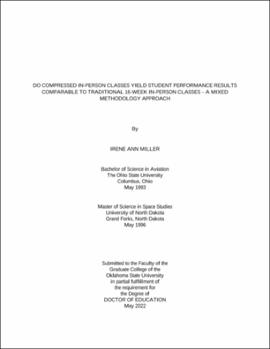| dc.contributor.advisor | Bliss, Timm J. | |
| dc.contributor.author | Miller, Irene Ann | |
| dc.date.accessioned | 2023-03-31T19:14:55Z | |
| dc.date.available | 2023-03-31T19:14:55Z | |
| dc.date.issued | 2022-05 | |
| dc.identifier.uri | https://hdl.handle.net/11244/337174 | |
| dc.description.abstract | Institutions of higher learning are offering an increasing number of compressed in-person classes with the goal of providing to their diverse student populations flexibility of instruction delivery. SIU and many other colleges are offering an increasing number of classes with compressed schedules to increase student enrollment (Krug, et al., 2015). The increase in the number of compressed classes presents the challenge of ensuring that the same academic rigor and breadth of knowledge are maintained in comparison to the traditional 16-week semester. Therefore, it is necessary for the compressed courses to provide the same student learning outcomes and cover the same course material; requiring faculty to use the same textbooks and course content. The purpose of this research study is to determine if students enrolled in off-campus classes with compressed schedules are receiving the same quality of instruction and producing the same student learning outcomes, as students enrolled in traditional on-campus 16-week courses. This study compared the performance of two groups of undergraduate students enrolled in the same Southern Illinois University (SIU) course that was delivered in two different modalities. A mixed methodology was used for data collection, as the researcher was applying quantitative and qualitative inquiry during the study. An independent samples t-test was conducted in SPSS to determine if there was a significant difference between the on-campus and off-campus classes’ final course grades. There was no significant difference found between the on-campus and off-campus classes. These results suggest that the delivery format of the course, (traditional 16-week format or compressed off campus weekend format), did not result in meaningful differences in the final course grades for the participating classes. | |
| dc.format | application/pdf | |
| dc.language | en_US | |
| dc.rights | Copyright is held by the author who has granted the Oklahoma State University Library the non-exclusive right to share this material in its institutional repository. Contact Digital Library Services at lib-dls@okstate.edu or 405-744-9161 for the permission policy on the use, reproduction or distribution of this material. | |
| dc.title | Do compressed in-person classes yield student performance results comparable to traditional 16-week in-person classes: A mixed methodology approach | |
| dc.contributor.committeeMember | Depperschmidt, Chad L. | |
| dc.contributor.committeeMember | Pavel, Samuel R. | |
| dc.contributor.committeeMember | Gardner-Vandy, Kathryn | |
| dc.contributor.committeeMember | Redmond Sanogo, Adrienne | |
| osu.filename | Miller_okstate_0664D_17658.pdf | |
| osu.accesstype | Open Access | |
| dc.type.genre | Dissertation | |
| dc.type.material | Text | |
| dc.subject.keywords | aviation | |
| dc.subject.keywords | college | |
| dc.subject.keywords | compressed | |
| dc.subject.keywords | education | |
| dc.subject.keywords | schedules | |
| dc.subject.keywords | traditional | |
| thesis.degree.discipline | Applied Educational Studies, Aviation and Space Science | |
| thesis.degree.grantor | Oklahoma State University | |
